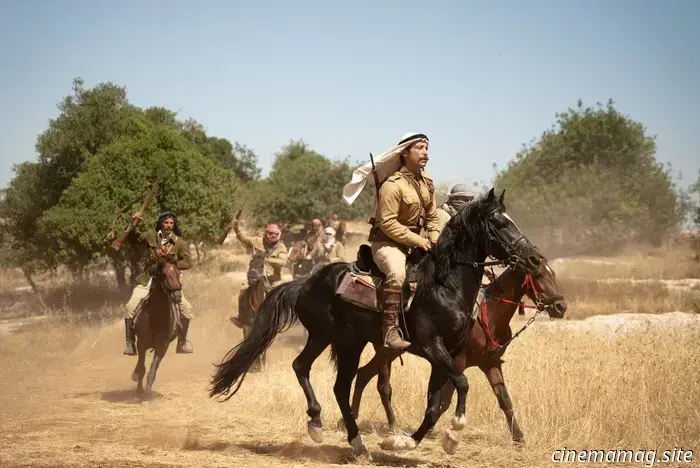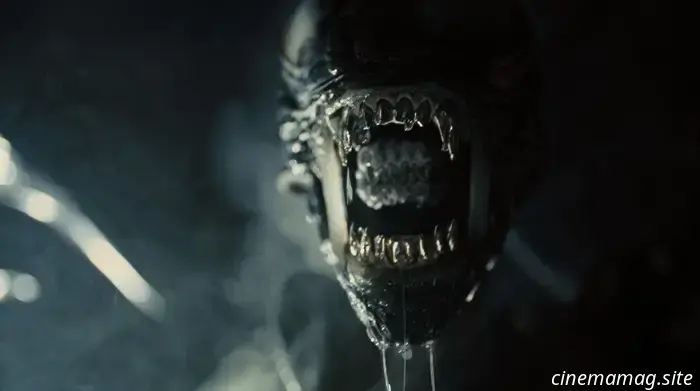
TIFF Review: Palestine 36 Provides a Wide Range of Insights and Historical Context
You might think that Amir (Dhafer L’Abidine) is genuinely interested in the village perspective when he asks his chauffeur Yusuf (Karim Daoud Anaya) to share the Palestinian experience with a group of landowners dining with him. However, he hardly gets a chance to start before one of the guests reminds him of his place: they are the ones paying British taxes while the farmers cannot even settle their debts. This scenario vividly illustrates the significant role that greed plays in the political discord of our world. They overlook the real issues facing their kin while pondering whether "Zionism could be a good thing," as their property holds the most importance to them.
This serves as important context that writer-director Annemarie Jacir presents in her latest film Palestine 36—a vast epic in contrast to her earlier character-focused dramas. She provides substantial weight to every aspect of the situation that has led to the ongoing genocide of the Palestinian people at the hands of Israel’s Zionist regime. It wasn't solely due to external forces like colonial Britain or the influx of Jewish settlers; it was also the misguided actions of Palestine’s own leaders, who allowed their ambition for self-advancement through European influence to obscure their judgment.
Yusuf acts as our entry point, connecting these two worlds by navigating between them. Coming from a farming background that relies on his presence for survival, this young man yearns for something greater. Who better to help him envision that future than Amir and his wife Khouloud (Yasmine Al Massri)? Amir mingles with British diplomats like Billy Howle’s Thomas and military figures like Robert Aramayo’s nefarious Captain Wingate, while Khouloud serves as a leading advocate for Palestinian freedom under a male pseudonym. Their respective influences within the ruling class and the people position them as potential change-makers.
Nevertheless, merely symbolizing hope is insufficient when Palestinian workers become increasingly radicalized by an apparent shift in political circumstances. Men like Khalid (Saleh Bakri) seek to avoid conflict; they are principled individuals working to support their families. Yet, as more Jewish immigrants arrive, the space for racist attitudes expands. Suddenly, Jews are compensated more than Arabs, and the notion of Arabs prioritizing community over individuals transforms into a back-handed compliment, compelling them to concede further ground to their “neighbors.” Ultimately, even Khalid recognizes the truth.
This leads to rebellion—not born from bloodlust or hatred, but from the need for survival. Land that has been cultivated by Palestinians and contains their ancestors' graves is handed over to Jewish settlers at no cost by the Crown’s decree (Jeremy Irons’ High Commissioner Wauchope conveniently shifts blame to the Motherland for his actions). Individuals like Thomas attempt to create borders that would grant farmers enhanced rights, but their actions eventually morph into mere providers of false hope due to their own naivete. Once Britain relinquishes that land, settlers are suddenly granted the right to defend their claim—rights denied to the Palestinians from whom it was taken.
As revealed through Jacir’s chapter titles and dates, this complete takeover occurs almost instantaneously. The film opens in 1936 and swiftly progresses to 1937, by which time everything has altered. The violence incited and supported by the British grants the Zionists overwhelming advantage based solely on the premise that they could declare the formation of a Jewish State in a territory that does not belong to them. Why is this so? Because they view a stronger allegiance with the Zionists than the Arabs. While the impoverished can discern this harsh reality, Amir continues to believe the deceptions, actively aiding in their perpetuation.
Everything is depicted: stone-throwing, landmines, and all the signs of rebel "animals" that have tainted the perspective of the Western world, but this time from the view of the desperation fueling such actions. The unprovoked and brutal violence inflicted upon Arabs merely for seeking recognition of their voices and rights underscores the blatant criminality against them with no repercussions. Many Hollywood narratives reduce the region’s story to terrorism; however, Palestine 36 provides the essential care to remind us that this label is often weaponized by oppressive forces to maintain their control. As Liam Cunningham’s Tegart states, “We don’t want another Ireland.”
Consequently, children are forced to witness their parents being murdered in the streets. They live in fear for their lives and come to understand their lack of worth simply because a foreign soldier, blinded by a superiority complex, derives satisfaction from exercising authority. Those with genuine power unknowingly relinquish it without cause, while those with none strive to seize it for themselves. Throughout all this, we witness compassion and a sense of human dignity emanating solely from one side: the Palestinian rebels. This does not imply they are devoid of violence; rather, one must consider where they learned this violence from.
The entire cast excels. From Hiam Abbass and Yafa Bakri in the
Other articles
 Punisher: Red Band #1 - Comic Book Teaser
Frank Castle is making an impressive comeback this Wednesday as Marvel Comics debuts its new Punisher: Red Band series. You can check out an early look at the first issue below with the official preview… FRANK IS BACK! Refresh your memory and prepare, True Believers — Frank Castle has RETURNED. With no recollections, a full magazine, and […]
Punisher: Red Band #1 - Comic Book Teaser
Frank Castle is making an impressive comeback this Wednesday as Marvel Comics debuts its new Punisher: Red Band series. You can check out an early look at the first issue below with the official preview… FRANK IS BACK! Refresh your memory and prepare, True Believers — Frank Castle has RETURNED. With no recollections, a full magazine, and […]
-Movie-Review.jpg) Christy (2025) - Film Review
Christy, 2025. Directed by David Michôd. Featuring Sydney Sweeney, Ben Foster, Katy O’Brian, Merritt Wever, Ethan Embry, Chad L. Coleman, Tony Cavalero, Jess Gabor, Valyn Hall, Cole Pedigo, Bryan Hibbard, and Marvin LaViolette. SYNOPSIS Raised in West Virginia — her moniker, “Coal Miner’s Daughter,” comes from her father's job — Christy (Sweeney) was outstanding in athletics [...]
Christy (2025) - Film Review
Christy, 2025. Directed by David Michôd. Featuring Sydney Sweeney, Ben Foster, Katy O’Brian, Merritt Wever, Ethan Embry, Chad L. Coleman, Tony Cavalero, Jess Gabor, Valyn Hall, Cole Pedigo, Bryan Hibbard, and Marvin LaViolette. SYNOPSIS Raised in West Virginia — her moniker, “Coal Miner’s Daughter,” comes from her father's job — Christy (Sweeney) was outstanding in athletics [...]
 New teaser for Die My Love featuring Jennifer Lawrence and Robert Pattinson.
MUBI has unveiled a teaser trailer for Die My Love, the forthcoming thriller directed by Lynne Ramsay (We Need to Talk About Kevin). Jennifer Lawrence plays the role of Grace, a mother battling to keep her sanity as she descends into psychosis after relocating to an inherited house in the countryside with her partner and their new [...]
New teaser for Die My Love featuring Jennifer Lawrence and Robert Pattinson.
MUBI has unveiled a teaser trailer for Die My Love, the forthcoming thriller directed by Lynne Ramsay (We Need to Talk About Kevin). Jennifer Lawrence plays the role of Grace, a mother battling to keep her sanity as she descends into psychosis after relocating to an inherited house in the countryside with her partner and their new [...]
 Star Wars: Jedi Knights #7 - Comic Book Teaser
Marvel Comics is set to release Star Wars: Jedi Knights #7 on Wednesday, and we have the official preview of the issue for you below; take a look… QUI-GON JINN IS DEAD! Or he will be… unless JEDI KNIGHTS MACE WINDU and AAYLA SECURA can locate the antidote to the poison that is threatening his life. The antidote can […]
Star Wars: Jedi Knights #7 - Comic Book Teaser
Marvel Comics is set to release Star Wars: Jedi Knights #7 on Wednesday, and we have the official preview of the issue for you below; take a look… QUI-GON JINN IS DEAD! Or he will be… unless JEDI KNIGHTS MACE WINDU and AAYLA SECURA can locate the antidote to the poison that is threatening his life. The antidote can […]
 Die My Love Trailer: Jennifer Lawrence und Robert Pattinson enthüllen sich in Lynne Ramsays psychologischem Drama
Following its premiere at the Cannes Film Festival, there were rumors that Lynne Ramsay returned to the editing suite to refine Die My Love, her first feature since 2017's You Were Never Really Here. With forthcoming screenings at the San Sebastián International Film Festival, Vienna International Film Festival, and BFI London Film Festival all featuring
Die My Love Trailer: Jennifer Lawrence und Robert Pattinson enthüllen sich in Lynne Ramsays psychologischem Drama
Following its premiere at the Cannes Film Festival, there were rumors that Lynne Ramsay returned to the editing suite to refine Die My Love, her first feature since 2017's You Were Never Really Here. With forthcoming screenings at the San Sebastián International Film Festival, Vienna International Film Festival, and BFI London Film Festival all featuring
 Fede Álvarez will hand over directing duties to another filmmaker for the sequel to Alien: Romulus.
Receiving widespread praise and grossing $351 million globally, Fede Álvarez adeptly revived the Alien franchise with Alien: Romulus. However, with just a few months left before production was scheduled to begin on the sequel, the director has announced his decision to “pass the torch” to another filmmaker. In an interview with TooFab, Alvarez […]
Fede Álvarez will hand over directing duties to another filmmaker for the sequel to Alien: Romulus.
Receiving widespread praise and grossing $351 million globally, Fede Álvarez adeptly revived the Alien franchise with Alien: Romulus. However, with just a few months left before production was scheduled to begin on the sequel, the director has announced his decision to “pass the torch” to another filmmaker. In an interview with TooFab, Alvarez […]
TIFF Review: Palestine 36 Provides a Wide Range of Insights and Historical Context
It seems that Amir (Dhafer L'Abidine) genuinely seeks the insights of the village when he requests his chauffeur Yusuf (Karim Daoud Anaya) to share the Palestinian experience beyond the city with a group of landowners gathered at his table. However, he hardly gets the introduction finished before one of the guests points out his position: it is they who
